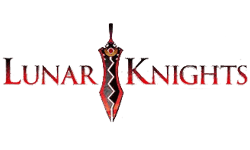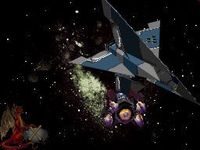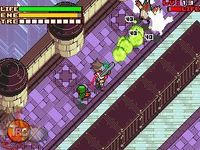|
|

|
PLATFORM
|
DS
|
BATTLE SYSTEM
|

|
INTERACTION
|

|
ORIGINALITY
|

|
STORY
|

|
MUSIC & SOUND
|

|
VISUALS
|

|
CHALLENGE
|
Moderate
|
COMPLETION TIME
|
Less than 20 Hours
|
|
OVERALL

|
+ Some nice dungeon designs
+ Good concept
- Needlessly cramped inventory
- Bland plot
- Lousy dash mechanic
- Just like in real life, the weather sucks
|
Click here for scoring definitions
|
|
|
Hideo Kojima's Nintendo portable interest started with the Boktai series on the Game Boy Advance. The solar sensor of those games was discarded for a similar project on the DS, but the action RPG vampire-fighting idea was retained. Lunar Knights showcases some interesting ideas and is fun to play at certain points, but the combined aggravations of certain mechanics leaves me cold to the idea of hunting down the Boktai games at this point in time.
The game begins with a self-proclaimed vampire hunter named Lucian seeking to deal out whatever brand of death actually affects the undead. He's doing this for vengeance, and to balance his nihilism, an ebullient boy named Aaron is subsequently introduced. Aaron seeks only to protect his friends and the planet, but ends up accompanying Lucian to prove himself — and because his father was killed by a vampire.
The setting of Lunar Knights is the most interesting aspect of its narrative, showcasing a world completely protected from the sun by an orbital device called the ParaSOL in order to provide a perfect playground for vampires. The genesis of this technology is also interesting, as it came from a race of immortals that deems the survival of life forms everywhere preferable to any other concern — thus a world in which vampires feed on humans without killing them is ideal. These concepts are unfortunately given inadequate development to take advantage of their potential. Lucian and Aaron are one note characters for the most part, and the supporting cast is largely unmemorable.
Lucian and Aaron begin the game separately, but before long they are united so that the player can switch between them for fighting purposes. Lucian uses a blade for close quarters combat while Aaron relies upon firearms to kill from a distance. The bare ingredients of combat are solid enough to allow for the enjoyable slaughter of numerous enemies, but the isometric perspective makes one particular control choice problematic. Dashing is done by double-tapping a direction, which is confusing when most of the time travel is done at diagonal vectors instead of straight. It is also tougher to pull off consistently than simply holding down a button would have been.
 Being hit with a paper airplane that size actually hurts.
Being hit with a paper airplane that size actually hurts.
|
|
Those aspects alone would be bothersome, but dashing drains the energy bar of whichever character is doing it. Energy is required to attack using the elemental affinities of the game, and Aaron cannot strike anything without using some. Considering the slow walking pace of the characters compared to some of the enemies, needing to ration energy use is a severe disappointment.
The characters are able to replenish their energy by standing in certain places to take advantage of direct sunlight and moonlight access. Outdoor dungeons are replete with opportunities to use this means of energy replenishment, but indoors only skylights allow access, and if the required celestial object isn't in the sky the only solution is to wait for it to appear. The day and night cycle of Lunar Knights can only be dealt with through patience due to its automatic nature, but other weather effects are influenced by visiting a certain NPC to have the climate altered. Ideally these changes would be implemented immediately, but some of them also require waiting for the in-game clock to reach a certain time of day, and dealing with this vexation is mandatory to proceed through several of the dungeons.
At first the twenty item limit of Lunar Knights' inventory seems fine, especially if one is using healing supplies frequently. Enemies often drop junk parts that will later be used to strengthen weapons, and for some reason the player must constantly go through the inventory to discover what these things are so that they can be consigned to a different menu that does not conflict with the usable materials. Constantly performing this annoying task quickly becomes bothersome, and the generosity of the game in supplying such junk items ensures that there will be no respite.
Character statistic growth is fairly constant as levels are gained, but certain enemies are consistently fast and powerful. The game is kind enough to allow players to continue by paying a fee upon death, minimizing the possible frustration of how scant the recovery time after being hit is. The bosses oddly tend to be easier than running the gamut of their stages, as a little pattern recognition goes a long way when facing them.
 "What happened? Are you okay? ... He slimed me."
"What happened? Are you okay? ... He slimed me."
|
|
Like a lot of DS games in the platform's early years, Lunar Knights was developed under the assumption that using the touch screen for certain parts was absolutely a good idea. Most of the time playing it is free of this hazard, but a few space shooter segments supply the requisite touch screen portion. The touch screen serves as a very responsive means of targeting the enemies, but making the stylus do double duty by also controlling the movements of the ship is needlessly confusing and can lead to far too many errors when enemies are very close to the ship.
A few FMV clips notwithstanding, Lunar Knights looks like many other DS action RPGs. Its visuals get the job done without pushing the system much. The music does a similar job, as some of the tracks are quite catchy while others fade into the background immediately. The voice acting is delivered well but almost always serves to redundantly say what the text onscreen already did.
The game's final dungeon is just one last annoying nail hammered into a vampire's coffin — not because it's the longest in the game, which it is not, but because Lunar Knights has the gall to remove the save option while traversing it. To say that this ingratiated me would only be accurate if the most sardonic possible tone of voice was employed, as it forced me to tackle the finale in one rush without a break. The game has some good ideas, but wading through the rest to experience them is not recommended. I was curious about the Boktai games once upon a time, but that curiosity has successfully been quelled.
Review Archives
|









